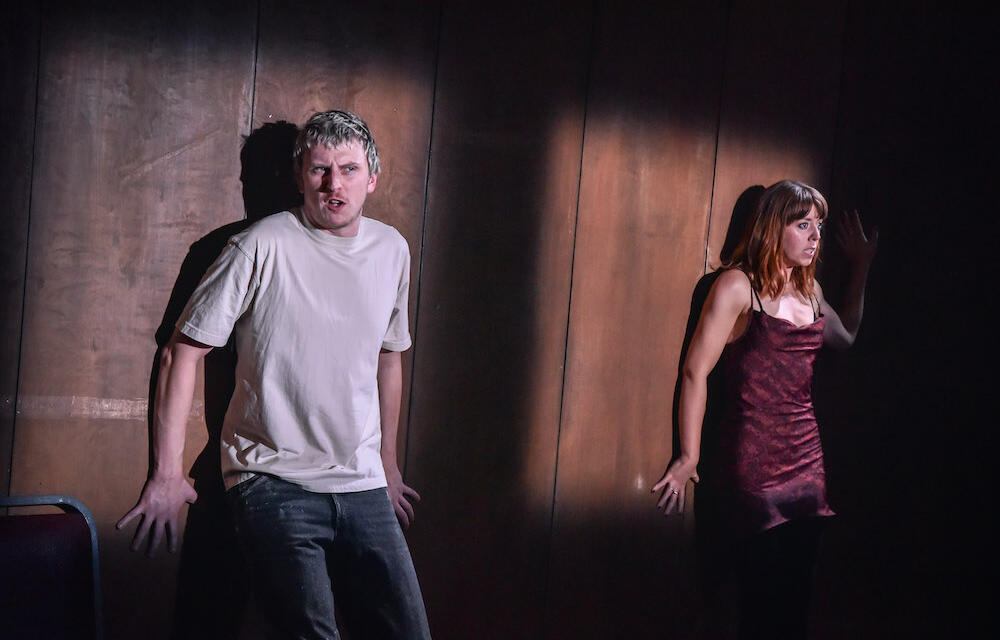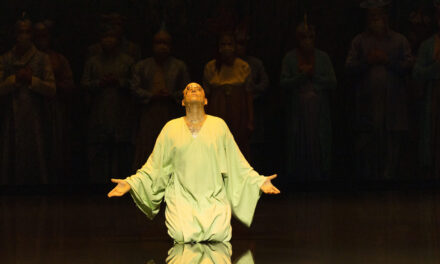Joe White is great at staging fraught emotions. His Mayfly in 2018 vividly showed a family whose members were at the end of their tethers; it also had an intriguingly intelligent form. In his latest, Blackout Songs, a 95-minute two-hander, these qualities are once again in evidence, and then some. Once again, he uses a flexible structure to represent some excruciating emotional material, and the result gives an almost overwhelmingly sense of the horrible realities of addiction, both to alcohol and to people.
As its title suggests, this is a story about booze. Not just casual tippling, but heavy drinking until you pass out, lose consciousness, lose memory. A nameless man and a woman first see each other at an AA meeting, and something clicks. It’s not just that they both have a drink problem; it’s also the way that sexual attraction goes hand in hand with the feeling that the other is psychologically right for you. This click then means that Him and Her are not only addicted to drink, but soon also to each other.
He is an aspiring painter at art college, where the authorities don’t approve of his drinking at all, while she is more interested in writing poetry and comes from a wealthy family, that she has walked away from. So it’s a story of a blitzed artist and a poor little rich girl. He is more sincere and she is more witty, full of amusing one-liners. He uses drink to fuel a wild kind of creativity, but drinks so much he damages himself physically as well as mentally. She drinks to escape, to numb herself, and uses sex for the same reason.
The play shows how their relationship develops, from a chance meeting through breakups and reunions. When things get too heavy, they try to stop drinking, but fail to stay off the wagon. At various moments they role play new identities, with new names and new backstories, but the catastrophic nature of their drinking means that their memories of each other and of their life together, and of life in general, are twisted. White conveys the damage that this does to them by replaying key episodes in their relationship, each time with significant differences of meaning.
Blackout Songs is powerfully written, with dialogues that are sometimes funny, and often emotionally intense. The repetition that you associate with listening to drunks is there, but also the real pain of individuals struggling with a condition that has become part of their identity. He cannot paint unless he is drinking; she cannot be at peace unless she’s sloshed. Alcohol is both a poison and a medicine; something you pour down the sink, but also conceal around the flat — just in case you’ll need it. The couple’s mutual dependency is illustrated by the metaphor of one carrying the other.
Everything that happens to this couple — from the death of parents to hospitalization — is bathed in the lurid light of self-justification, pitiful explanation and argumentative aggression. While sometimes the dialogues are just the drink talking, there are also moments of tender connection, surreal talk and painful truth. White’s writing shows both the exhilaration of getting legless with a lover, and the ghastly comedowns and mutual resentments. Despite some loose ends, as when a new lover is mentioned and then completely ignored, this is superbly convincing.
Guy Jones’s production, on Anisha Fields’s bare set, with its discolored brown wooden floor and institutional chairs, is gripping and thought-provoking. The performances, by Alex Austin and Rebecca Humphries, are excellent: he is the needy lover, given to episodes of fury and vulnerability; she is the cruel lover, running away when things get too intimate. Both come to depend on each other, as much as on alcohol, and their relationship is punctuated by blackouts, choreographed by Iskandar R Sharazuddin with sound by Holly Khan. An emotionally truthful story which is both unsentimental and oddly romantic.
- Blackout Songs is at Hampstead Theatre until 10 December.
This post was written by the author in their personal capacity.The opinions expressed in this article are the author’s own and do not reflect the view of The Theatre Times, their staff or collaborators.
This post was written by Aleks Sierz.
The views expressed here belong to the author and do not necessarily reflect our views and opinions.


















